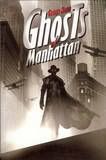 Pyr / April 2010
Pyr / April 2010
Reviewed by: I.E. Lester
This book can be summed up in nine words: Batman copy in a slightly altered 1920s New York (if you allow "1920s" as a single word in shorthand).
The Ghost – our superhero – is, like Batman, a normal man. He has no actual superpowers but rather relies on skill, cunning and an array of fancy gadgets to help him catch the bad guy. Even his alter ego, Gabriel Cross, is just a renamed Bruce Wayne hiding as he is behind his vain, trust fund playboy public image.
Having been re-imagined along steampunk lines by Mann, the New York of this novel is decidedly Gotham-flavored, darker than the 1920s-era city we’ve come to know. Technology is time-blended, with coal-powered automobiles and self-lighting cigarettes just some of the subtle technological differences.
History, too, has progressed down a very different route from a splitting point in Victorian times, resulting in a Cold War between the USA and a still-powerful Great Britain. To be honest, though, this is little more than window dressing on what is at heart a very derivative novel. No amount of tech tweaking or history rewriting is going to prevent the inevitable comparisons to the Batman mythos.
That said, Ghosts of Manhattan is by no means a bad read. In fact, for all its lack of originality, this actually reads quite well. George Mann has a very straightforward writing style. He writes devoid of flowery, inconsequential details and, as a result, the plot is very fast-paced and some of the action sequences – most notably a dogfight amongst the skyscrapers of Manhattan – can be very exciting to read.
His characters are engaging enough to make you care for them. Nightclub singer Celeste is a wonderful over-the-top gangster's moll figure, cast here in the role of Cross' main squeeze. British museum curator Arthur Wolfe, possibly the best of the supporting cast, serves in an almost Alfred-esque manner to Cross's Ghost, supplying him, and hence us, with vital information at a critical moment. Having Wolfe provide certain significant information to the Ghost allows nicely disguised moments of exposition, allowing the plot to unfold without seeming too obvious and without interrupting the flow of the novel.
There are elements of this book worth recommending, but this reviewer was ultimately left wanting more. If the author had included more detail of the differences in technology and alternate timelines this may have felt less like a Batman clone and more like the claim on the back cover: "The World's First Steampunk Superhero". Still, it wasn't a bad attempt.
Purchase Ghosts of Manhattan by George Mann